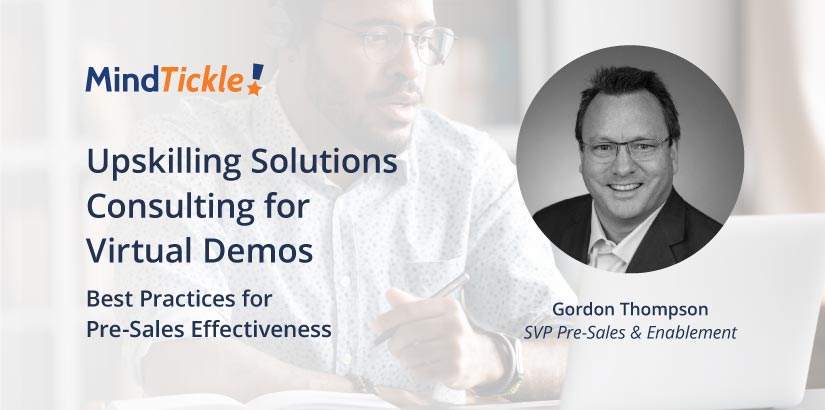Now more than ever, our homes have become our world. And for the foreseeable future, sales calls and product demos will be conducted from home, virtually. It’s a major adjustment and the challenges typically faced during in-person meetings (such as ensuring and maximizing knowledge retention) are made all the more challenging by additional complications that arise from virtual meetings. This means sales readiness and enablement leaders need to rethink how they can partner with pre-sales leaders of solutions consulting / solutions engineering (SC / SE) teams to upskill and reskill their teams for this new normal.
When your SCs are not in the same physical space as their meeting attendees, they’re not able to read the prospect’s or customer’s body language and adjust their presentation accordingly. However, while meeting virtually lacks the personal connection more easily achieved in face-to-face meetings, they still must strive to achieve the same goals — professionalism, making an impact, and closing deals.
The following are 10 best practices pre-sales leaders and enablement practitioners should focus on when looking to onboard, develop, and maximize the knowledge and skills of solutions consulting and sales engineering teams.
- Do the pre-work. When SCs come prepared with a basic background on the prospect/customer and an idea of how the meeting will flow, they’re already at an advantage. Ahead of the meeting, research about the attendees should be conducted so that they can make a connection and build rapport early in the call. Things like looking for a colleague in common, similar hobbies, or previous work experience. Then, the SC should gather the participants on their team to conduct a dry run of the meeting (not just a demo dry run) and go through each part of the agenda to ensure alignment with the allotted time.
- Keep them on their toes. SCs should call someone by name early in the meeting. This not only engages the remote audience but also shows that they remember the names of the attendees. They need to also be prepared to pivot away from the defined agenda even if they went through it to confirm that everyone was on board with the flow of the meeting. An additional way to keep the audience engaged is by recapping any prior discussions using their names.
- Break up the flow. When people are on a virtual call, they tend to tune out. To avoid this, SCs should take intentional breaks every 5-7 minutes. During the presentation, they can ask for questions or even call out the champion in the room by name. Knowing and using the “tell-show-tell” approach multiple times over the call helps to break up the flow and reinforce points that need to be conveyed.
- Leverage third-party tools. The mouse pointer is not a demo tool, and circling a region on the screen is not ok. To make demos more professional using boxes and arrows, SCs should know how to use ZoomIt (for PC) or DemoPro (for Mac). Additionally, Poll Anywhere can make calls interactive and memorable. Your current tool may also have some of these capabilities too.
- Rely on the AE. The AE is the SC’s ‘wing-person’ and an invaluable asset during these calls. They can monitor the chat, record prospect questions and who asked the questions to review after the call, and even jump in on tough questions as needed. An open and private channel to communicate with them (e.g. Text or iMessage) may be needed during the call. Likewise, keeping their coach updated on how the meeting is progressing is important for guidance and feedback.
- Maintain a steady pace. Without body language or paralanguage to help in an in-person meeting, it’s difficult to perceive subtle cues that may indicate that a rep might be speaking too fast and that they’ve lost their audience. To help you stay on pace, they can take deliberate breaths.
- Turn on the video. SCs absolutely need to know how to work their video tool, including advanced features like surveys, notations, or whiteboarding. Even basic features like how to mute and unmute are important for a successful demo. Similarly, they should think about how they appear to the audience. Conducting the meeting from a bedroom is less than ideal. Knowing how to use and incorporate a green screen to mask surroundings can be helpful here. If you are using video and have limited network bandwidth, you may need to dial in for voice.
- Manage the time. SCs should plan for meetings to last 45 minutes for an hour meeting. Being mindful that attendees may have a hard stop, it’s important to try and not go over the allocated time. It can be much more difficult to stay on time with virtual meetings, so the meeting prep and taking extra care during the call will help them to finish on time.
- Be memorable. Another thing SCs can do to continue to build rapport is to present as if they were in person and make a connection by sharing something personal upfront. To avoid sounding robotic, they should use voice inflections to differentiate areas of importance. And to keep the focus on the rep and the demo, they need to minimize the words on their slides. Otherwise, the audience will be reading the slides instead of listening to the demo. And, if the rep isn’t speaking, they need to stay on mute (check and double-check this!).
- Close strong. Again, SCs need to employ the “tell-show-tell” approach. Before creating next steps together, they should remember to recap the entire flow and the business outcomes. It doesn’t hurt for them to ask their attendees if they were satisfied with what they saw, for situational awareness.
We’ve survived a number of events — the dot-com bust, Y2k, 9/11, the ’07-’08 recession — and we’ve come out on the other side with a new definition of normal. With a few bruises and a whole lot more experience, we readjust and continue progressing forward. No one knows what our new normal will look like in six months, 12 months or two years from now, but what is clear is that more and more commerce will be done remotely, virtually, and not face to face. With that in mind, these best practices will stand the test of time to help pre-sales leaders and enablement practitioners develop the knowledge and skills SCs need to have impactful virtual meetings now and in the future.



 By Helen Waite
By Helen Waite
 By Poornima Mohandas
By Poornima Mohandas
 By Rahul Mathew
By Rahul Mathew